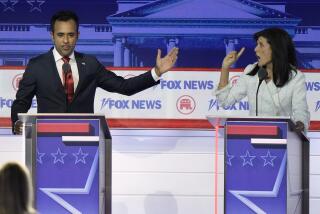Diplomacy feud throws 2 candidates into relief
- Share via
WASHINGTON — A spat between Democratic presidential contenders Hillary Rodham Clinton and Barack Obama escalated Thursday as the senators traded swipes over the proper way to conduct diplomacy with hostile nations.
Their four-day feud over foreign relations has served as a proxy for the larger battle between the two candidates over which has the experience needed to be president and which offers the sharpest change in direction for the country.
For the record:
12:00 a.m. July 28, 2007 For The Record
Los Angeles Times Saturday July 28, 2007 Home Edition Main News Part A Page 2 National Desk 1 inches; 40 words Type of Material: Correction
Clinton-Obama dispute: An article in Friday’s Section A about a presidential-campaign feud between Sens. Hillary Rodham Clinton (D-N.Y.) and Barack Obama (D-Ill.) said that in 2003 Clinton voted to authorize the U.S. invasion of Iraq. The vote was in 2002.
In New Hampshire, Obama seized on Clinton’s statement in a debate Monday that she would be unwilling to meet, without preconditions, with leaders of Iran and other nations at odds with the United States.
“I’m not afraid to lose the PR war to dictators,” he said Thursday at a rally in Concord, alluding to the New York senator’s comment that she would not want to be used by foreign leaders for propaganda. “I’m happy to look them in the eye and say what needs to be said. I’m happy to tell them what I think. I’m not going to avoid them.”
The Illinois senator added: “I don’t want a continuation of Bush-Cheney. I don’t want Bush-Cheney lite. I want a fundamental change.”
On CNN, Clinton responded by mocking Obama’s call for a new “politics of hope.”
“I’ve been called a lot of things in my life, but I’ve never been called George Bush or Dick Cheney, certainly,” she said. “You know, you have to ask: Whatever happened to the politics of hope?”
The burst of sniping has marked the sharpest clash between the two since media mogul David Geffen, an Obama supporter, harshly criticized Clinton in February.
Clinton has held a wide lead in Democratic polls for months, but Obama has been raising more money, underscoring the threat that he poses to her effort to establish herself as the party’s inevitable White House nominee.
The dust-up started Monday at a Democratic debate in South Carolina after a question on whether the candidates would be willing to meet with leaders of North Korea, Syria, Venezuela, Cuba and Iran without preconditions during their first year as president.
Obama said he would. Clinton said she would insist first on vigorous diplomacy.
Afterward, the Clinton campaign pounced on Obama’s response, saying it showed he was unprepared to lead the country whereas she had the strength and experience to be commander in chief. On Tuesday, Clinton told an Iowa newspaper, the Quad-City Times, that Obama’s response was “irresponsible and, frankly, naive.”
“Sen. Obama gave an answer which I think he is regretting today,” she said.
Obama, in an interview with the same paper, compared Clinton’s stand to President Bush’s refusal to meet with leaders of U.S. adversaries.
“If Sen. Clinton’s interested in a continuation of the Bush-Cheney diplomatic strategies over the next several years, that’s fine, but she certainly can’t claim the mantle of change,” he said.
“If you want to talk about irresponsibility and naivete, look at her vote to authorize George Bush to send our troops into Iraq without an exit plan, and then asking the Pentagon about what the plan is five years later.”
Clinton voted in 2003 to authorize the U.S. invasion of Iraq. Obama, then an Illinois state senator, spoke out against the war at the time.
From New Hampshire on Thursday, Obama told reporters on a conference call that the dispute boiled down to “a debate over the same conventional thinking that led people to authorize the war in Iraq without asking questions versus an approach to foreign policy that asks questions.”
Clinton, in turn, told CNN that she wanted to “end the Bush era of ignoring problems, ignoring enemies and adversaries.”
Though renewing her call for diplomacy, she said, “I don’t want to see the power and prestige of the United States president put at risk by rushing into meetings with the likes of Chavez and Castro and Ahmadinejad.” Hugo Chavez is president of Venezuela, Fidel Castro of Cuba and Mahmoud Ahmadinejad of Iran.
Democratic strategist Bill Carrick, who is unaligned in the presidential nomination contest, said the tiff had captured a central dynamic of the race.
“The Obama campaign wants it to be about change, the Clinton campaign wants it to be about experience, and they’re going to make that contrast back and forth,” he said. “This week, it really took on some definition between these two candidacies.”
--
More to Read
Get the L.A. Times Politics newsletter
Deeply reported insights into legislation, politics and policy from Sacramento, Washington and beyond. In your inbox twice per week.
You may occasionally receive promotional content from the Los Angeles Times.











